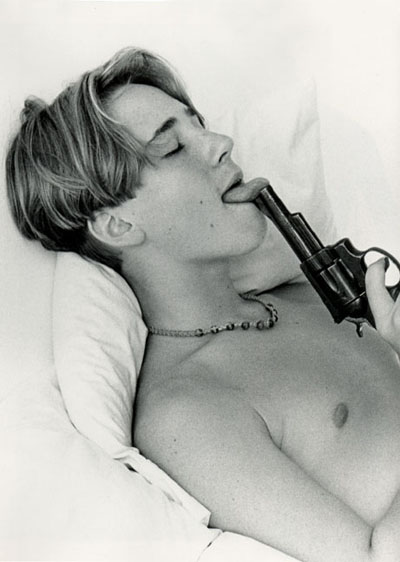 Larry Clark The International Center of Photography (ICP) will present the first American retrospective of the work of Larry Clark, one of the most important and influential American photographers of the second half of the 20th century. The exhibition, "Larry Clark", will include the full spectrum of Clark's work, spanning five decades and as many media. Beginning with his landmark book "Tulsa" (1971), Clark has produced an extraordinary range of photographs and films. Clark's work represents - probably better than any other photographer's - the important historical transition from the documentary-style photojournalism of the 1950s to the more personal and investigative photographic explorations of the 1970s and 1980s. His early black-and-white photography (Tulsa) is rooted in the era of W. Eugene Smith, Robert Frank, and Diane Arbus, and has influenced the work of later photographers such as Nan Goldin and Richard Prince and inspired such award-winning films as "Taxi Driver" by Martin Scorsese, "Rumble Fish" by Francis Ford Coppola and "Drugstore Cowboy" by Gus Van Sant. His recent independent feature films (such as "Kids", "Bully", and "Ken Park") show his continuing relevance for contemporary audiences. Clark is known for his frank engagement with challenging subject matter. These subjects are an integral part of his explorations of various themes in American culture: the exploitation of teenagers in American mass media (teen idols as pinups and sex objects); the confusions created for teen viewers by images of intense violence and sexuality; the responsibility borne by adults, especially parents, for the problems faced by young people; and the double-edged and largely unexplored aspects of the construction of masculinity in American culture. "ICP is committed to examining major currents in photography and has a long tradition of organizing exhibitions by artists whose work has been extremely influential, including Ralph Eugene Meatyard, Helmut Newton, Sebastião Salgado, Man Ray and Hans Bellmer," said ICP Director Willis Hartshorn. "Larry Clark has had a tremendous influence on the style and subject matter of at least two generations of photographers and filmmakers, and this retrospective provides the first opportunity for an American audience to examine the full scope of his work." "Larry Clark" will bring together for the first time key works from Clark's career, illuminating the thematic and autobiographical threads that run through the artist's work. Filling almost the entire exhibition space at ICP, "Larry Clark" will present a comprehensive overview of the artist's work in photography, collage, video, bookmaking, and film. The original set of "Tulsa" photographs used to print the book will be exhibited, as will outtakes from "Tulsa" that have rarely been seen. All other major bodies of his photographic output will be presented, including the complete "Teenage Lust", color portraits of skater kids in New York City from the mid-1990s, and a 1996 return to Tulsa to document the now largely Southeast Asian and Latino subcultures of his hometown. Also on view are a series of collages from 1989 to 1992 that include Clark's photographs combined with media images of teenagers, particularly those dealing with the intersection of teens and violence that both shock and fascinate the public. Two videos from 1992 feature clips from the Phil Donohue and Bryant Gumbel television programs that further explore the issues raised in the collages: the hypocritical public fascination with and condemnation of troubled teens. The exhibition will include a screening room in which several of Clark's most important films will be shown. Larry Clark was born in Tulsa, Oklahoma in 1943. His mother was a portrait photographer in Tulsa, and Clark worked in the family business, going door-to-door selling his mother's work. After high school, he studied photography at the Layton School of Art in Milwaukee, Wisconsin (1961-63), and then returned to Tulsa to photograph his circle of friends as they unselfcon-sciously lived their lives of drug use, violence, and sex before his camera. In 1971, these photographs were published in "Tulsa", a book that became a controversial classic for its unsparing yet non-judgmental portrait of his friends. In an interview with ARTForum in 1995, Clark said, "The one thing I wanted to do in "Tulsa" was cut through the bull... and tell the truth." Clark's next book, "Teenage Lust" (1983), is a loosely constructed autobiography told through family photographs, news clippings, and Clark's own photographs. He explores the theme of emerging masculinity in "1992" (1992) and "A Perfect Childhood" (1995), both of which focus on teenage boys, a population Clark felt was both "sexualized and demonized." His collages and videos of the late 1980s and early 1990s broaden this investigation into revealing the ways that mass media alternately creates, rejects, and eroticizes young people. In 1995, Clark released his first feature film, "Kids", which premiered at that year's Sundance Film Festival and was hailed as "an instant classic" and "a wake-up call." "Kids" was followed up by "Another Day in Paradise" (1998), "Bully" (2001), "Teenage Caveman" (2001), and "Ken Park" (2002). He is currently at work on a new film. Clark's work is represented in the photography collections of nearly every major museum, including the Metropolitan Museum of Art, The Museum of Modern Art, the Whitney Museum of American Art, the San Francisco Museum of Modern Art, and the Houston Museum of Fine Arts. This exhibition and its related programs were made possible with support from The Andy Warhol Foundation for the Visual Arts, the International Center of Photography Exhibitions Committee, the Elaine Dannheisser Foundation, and other individual donors. Exhibition: March 11 - June 5, 2005 Opening hours: Tue-Thu 10 am - 6 pm, Fri 10 am - 8 pm, Sat/Sun 10 am - 6 pm International Center of Photography 1133 Avenue of the Americas @ 43rd St. New York, NY 10036 Telephone +1 212 857 0000 Fax +1 212 857 0090 Email info@icp.org www.icp.org |